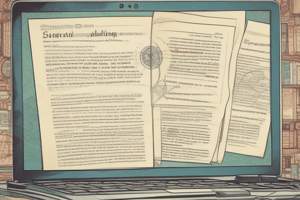Podcast
Questions and Answers
What is a security policy?
What is a security policy?
A document describing a company’s security controls and activities.
Who should be involved in the development of a security policy?
Who should be involved in the development of a security policy?
- IT Team
- Legal Team
- HR Team
- All of the above (correct)
The IT team should develop security policies on their own.
The IT team should develop security policies on their own.
False (B)
What must security policies be for them to be effective?
What must security policies be for them to be effective?
How many types of policies does every organization typically have?
How many types of policies does every organization typically have?
A security policy can generally be ______, regulative, and advisory.
A security policy can generally be ______, regulative, and advisory.
What is the purpose of personnel management in security policies?
What is the purpose of personnel management in security policies?
Flashcards are hidden until you start studying
Study Notes
Security Policy
- Explains how a company protects its physical and information assets.
- A document with a company's security controls and activities.
- Sets intentions and conditions to safeguard assets and improve company organization.
- Converts security aspirations into measurable aims, guiding users on system development, installation, and maintenance.
Policy Development
- A collaborative effort involving various stakeholders within an organization affected by the policy.
- IT team should not solely develop security policies, as it's a shared responsibility.
- Key participants include:
- Board: Provides oversight and review for policy adherence in exceptional or problematic situations.
- IT Team: Primary consumers of policy information, developing standards for computer systems and security controls.
- Legal Team: Ensures legal compliance and guides appropriate policy content.
- HR Team: Obtains confirmation from employees regarding policy understanding and enforces disciplinary actions.
Policy Development Approach
- Starts with gathering information and requirements.
- Proceeds to defining, proposing, and approving the policy.
- Results in the development of a comprehensive security policy document.
Policy Audience
- Includes a broad range of individuals:
- Senior Management
- Employees
- Stockholders
- Consultants
- Service Providers
- Policies should be clear, concise, and well-illustrated for effective comprehension by all members of the audience.
Policy Classification
- Three main types:
- Written Policies: Formal documentation of security measures.
- Mental Policies: Employees understanding and internalization of security practices.
- Implemented Policies: Active execution of security controls.
- Part of the management control hierarchy, guiding individuals on acceptable conduct.
- Focuses on "what" should be done, leaving the "how" to individual implementation.
- Three major categories:
- Physical Security: Safeguarding physical assets with measures like controlled access, surveillance, and alarms.
- Personnel Management: Adheres to secure business practices, including secure password management and confidential information handling.
- Hardware and Software: Directs the usage and control of technology and network resources.
Studying That Suits You
Use AI to generate personalized quizzes and flashcards to suit your learning preferences.




